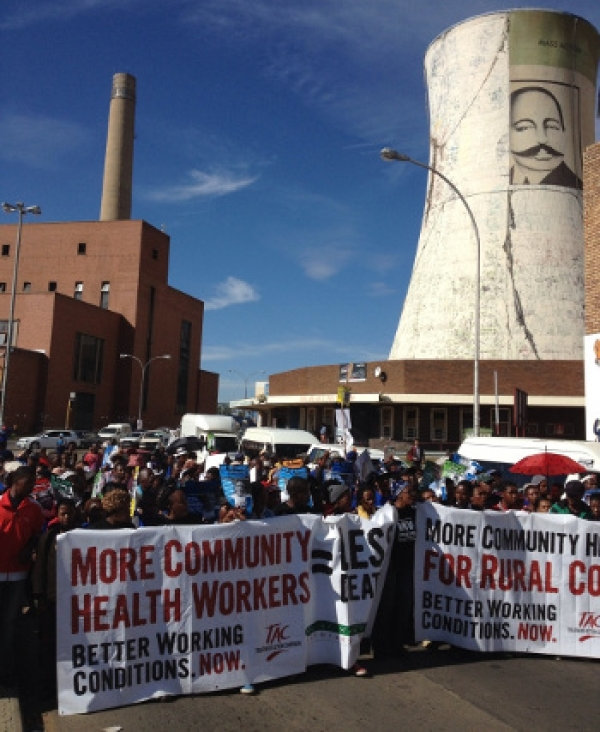
Protest in Bloemfontein in March 2015 outside Pelonomi Regional Hospital in support of dismissed health workers. Photo courtesy of TAC
18 November 2016
Yesterday, the Free State High Court overturned the convictions and sentences of 94 protestors, most of whom were health workers in the Free State Department of Health. The 94 had been convicted in the Bloemfontein Regional Court of contravening section 12 of the Regulation of Gatherings Act, 1993 (RGA) when they held a vigil outside Bophelo House, the headquarters of the Department, in July 2014.
The protestors initially gathered on 9 July 2014, after being dismissed by the department, to protest the failures of the provincial health care system. Their protest consisted of non-violent activities like singing and chanting. When the police arrived, they advised the protestors that their gathering was illegal – as they did not have the required documentation – and ordered them to disperse. The police then arrested approximately 80 protestors who did not comply. A second group of approximately 30 protestors gathered early on 10 July 2014 and were subsequently arrested.
The protestors were all arrested for the same offence of contravening the RGA by attending a gathering when a ‘responsible officer’ had not been given prior notice of the gathering. This was the only charge against them as the protests had been peaceful and none of the protestors had resisted arrest. Simply put, the protestors were arrested for attending a protest, which is not an explicit offence under the RGA.
While 94 of the arrested protestors pleaded not guilty, a few of them pleaded guilty and acquired criminal convictions according to a statement issued by the Treatment Action Campaign (TAC),which has been fighting for the rights of these protesters and highlighting the troubles of the Free State health system. In October 2015, the 94 protestors who pleaded not guilty were convicted of contravening the RGA and given suspended sentences of three months imprisonment with the option of a R600 fine.
The provisions of the RGA apply to gatherings of more than 15 people on any public road or place if they meet to discuss the actions of the government, political parties or political organisations. Before such a gathering takes place, the people convening the gathering have to give notice to a ‘responsible officer’, usually seven days before the event. The RGA came into force before the Constitution and replaced a number of apartheid-era statutes used to supress protest action.
All 94 protestors appealed their convictions on the same basis, that the actions they were convicted of – namely attending a gathering where prior notice was not given – were not criminal offences under the RGA. Under the RGA, a person who convenes a protest without giving prior notice is guilty of a criminal offence but there is not equivalent provision for the people attending the protest.
The protestors also argued that if the RGA was interpreted to make mere attendance at a gathering a criminal offence, it would contravene their constitutional right to protest. The primary basis for their challenge was that the protestors could not be convicted of a criminal offence if their conduct was not a crime under the RGA.
The state argued that a failure to give prior notice for a gathering would mean it is automatically prohibited, because prior notice allows authorities to put measures in place to ensure no one is injured by the protest activity.
By considering whether attendance could be a criminal offence under the RGA, the court recognised that some gatherings and protests occur spontaneously and, as a result, it is not always possible for prior notice to be given.
The court also recognised the importance of the constitutional right to freedom of assembly as central to democracy and giving ‘a voice to the powerless’. The court said that the state’s interpretation of the RGA would result in protestors potentially being imprisoned and getting criminal records, which undermines the spirit of the Constitution.
The court found that the RGA did not create an offence for mere attendance at gatherings where no prior notice had been given. This means that protestors who attend spontaneous peaceful protests are not committing a crime and cannot be arrested unless the protests become disruptive.
A full bench (three judges) of the Free State High Court delivered the judgment: Judges Mahube Betty Molemela, KJ Moloi and Lepono Lekale.
While this judgement represents a victory for protestors and the right to freedom of assembly under our Constitution, it is important to remember the two year long battle these protestors faced before having their rights vindicated. They had the support of many pro bono lawyers and NGOs such as TAC and SECTION27 who made sure their case was publicised, and assisted in covering the costs of litigation and other costs associated with attending court. This, unfortunately, is not the reality for many in our country and hopefully, they won’t have so long and hard a battle for their rights to be vindicated next time.